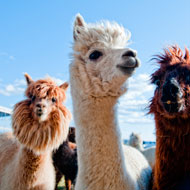
Plans to launch legislation covering specified non-bovine species
A public consultation is underway in Scotland on proposals to introduce controls and legislation to address bovine tuberculosis (TB) in specific non-bovine animals.
The consultation, which began on Monday, runs for 12 weeks and will consider the Scottish Government's proposal to introduce legislation and a regime of TB controls covering camelids (llamas, alpacas, vicunas, guanacos), goats (farmed or domestic), sheep, pigs and deer (farmed).
TB is a serious infectious disease of cattle that can be spread to other animals.
Richard Lochhead, cabinet secretary for Rural Affairs and Environment, said:
“Although the cattle industry is strictly regulated for TB, there are no legal powers in Scotland specifically covering controls of non-bovine species, except deer, where TB is strongly suspected or confirmed.
“The European Commission recognised Scotland as being officially tuberculosis free in September 2009 and the Scottish Government is very keen to maintain this.
“Introducing a non-bovine TB Order will provide Scottish Ministers and the Animal Health Veterinary Laboratories Agency (AHVLA) with the powers needed to deal effectively and quickly with TB incidents in camelids, goats, sheep, pigs and deer when they arise. It will also give us the ability to provide animal keepers with statutory compensation for animals slaughtered as a result of TB.
"We are launching this public consultation to engage directly with the various livestock sectors and who will shortly be invited to meet with officials to discuss any issues raised by the proposal.”
To view the consultation papers, visit: http://www.scotland.gov.uk/Publications/2014/09/9485



 The Animal and Plant Health Agency (APHA) has updated its online reporting service for dead wild birds.
The Animal and Plant Health Agency (APHA) has updated its online reporting service for dead wild birds.